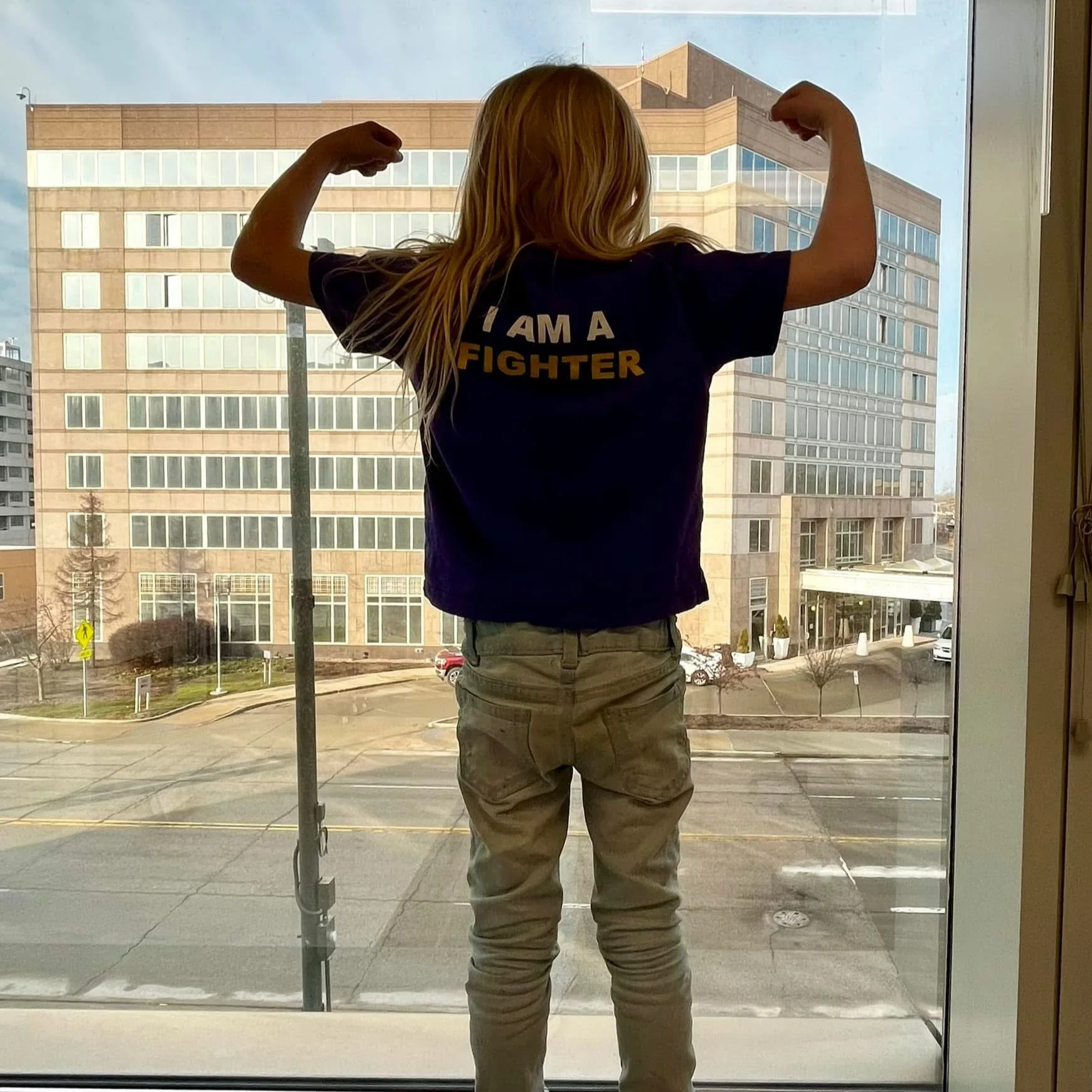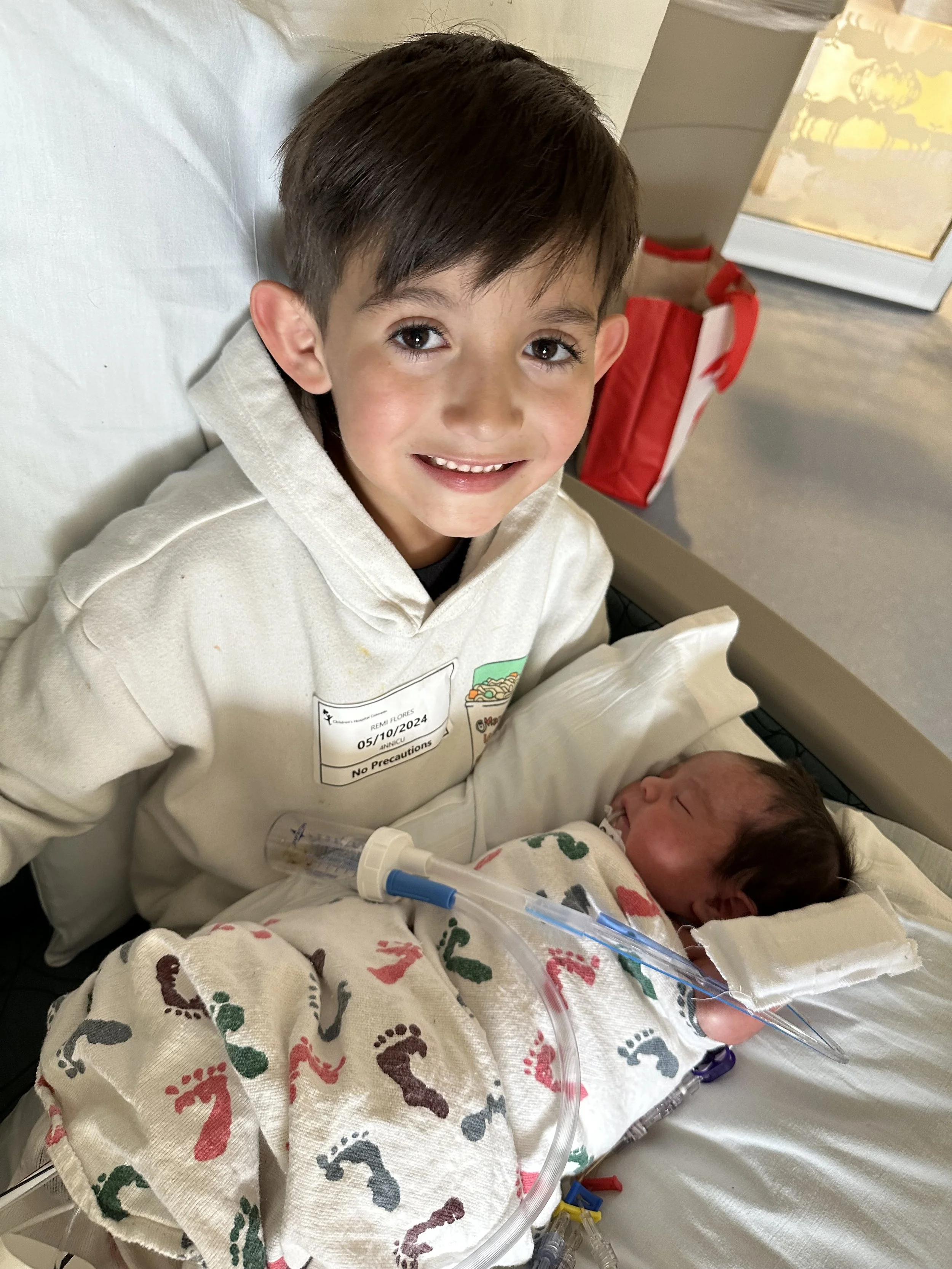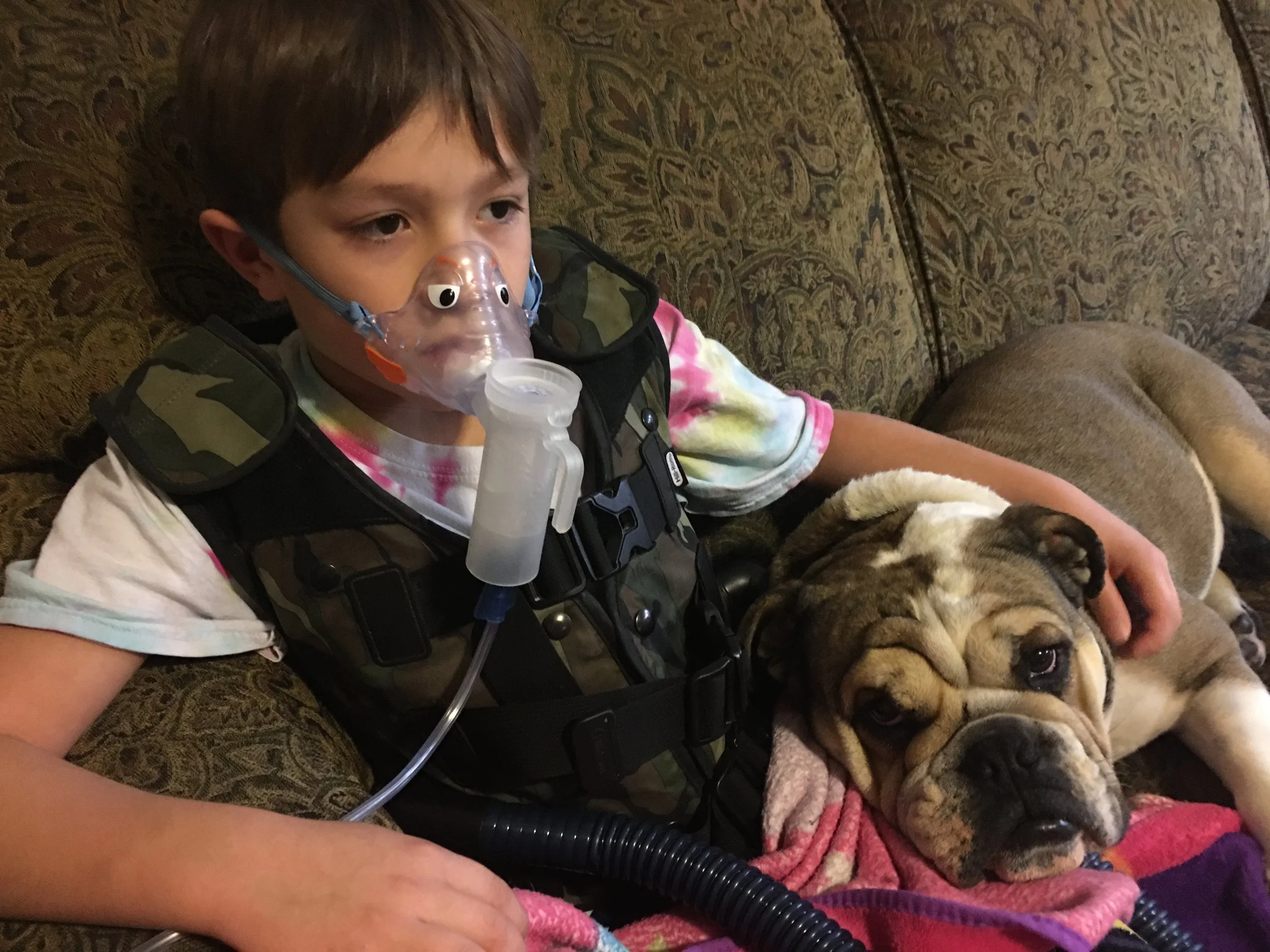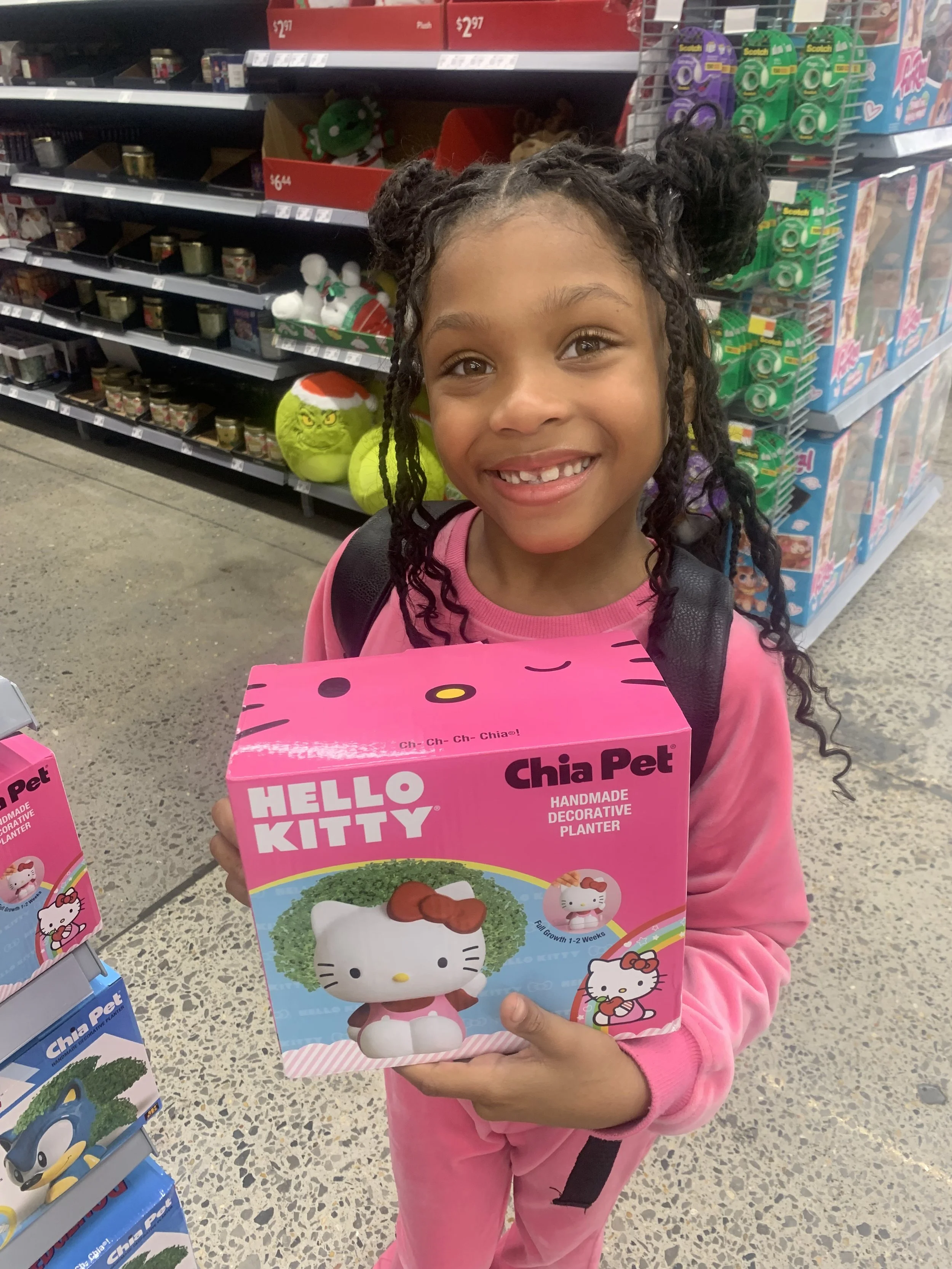Babies Born with Cystic Fibrosis: Your Complete Guide to Early Hope, Care, and Thriving
The call came on a Tuesday morning. Sarah had just finished feeding her three-week-old daughter Emma when the pediatrician's office called about the newborn screening results. "We need to schedule a follow-up test," the nurse said gently. "Emma's screening showed elevated levels that require further testing for Cystic Fibrosis."
In that moment, Sarah's world shifted. Like thousands of parents each year who receive similar calls, she found herself thrust into unfamiliar territory, filled with medical terms, uncertainty, and fear. But here's what Sarah discovered over the following months, and what we at Claire's Place Foundation want every family to know: a CF diagnosis isn't the end of dreams; it's the beginning of a different, but equally beautiful journey.
Today, babies born with Cystic Fibrosis are living longer, healthier lives than ever before. Thanks to early detection through newborn screening and advancing treatment intervention, children with CF can grow up to attend school, play sports, pursue careers, and build families of their own. Our own founder, Claire Wineland, was living proof of this possibility. From her hospital bed, Claire built our organization and inspired millions of people around the globe.
If you're reading this because your baby has been diagnosed with CF, or you're supporting someone who has, know this: you're not alone, and this diagnosis doesn't define your child's limits—it reveals their strength before they even know they have it.
A quick note from our hearts to yours: While we've packed this article with the most current information available and insights from our community, we want to be clear that we're not doctors, and this isn't medical advice. Every baby with CF is unique, and your healthcare team knows your little one best. Think of us as your informed friends who've been where you are; we're here to share what we've learned and support you along the way, but always lean on your CF care team for medical decisions. They're the experts, but Claire’s Place is here to walk alongside you with love and understanding.
Understanding Cystic Fibrosis in Newborns: The Basics Every Parent Needs
Cystic fibrosis is an inherited genetic condition that causes thick and sticky mucus to build up in the body, particularly affecting the lungs and digestive system. While this sounds overwhelming, understanding the basics empowers you to become your child's best advocate from day one.
What Causes CF in Babies?
To have CF, a baby must get two copies of the CF gene, one from each parent. Neither parent typically has CF themselves—they are carriers who each passed one copy of the gene to their child. This isn't anyone's fault; it's simply genetics.
Think of it like this: if eye color genes determine whether a baby has blue or brown eyes, the CFTR gene determines how well a baby's cells can move salt and water. In CF, this process doesn't work properly, leading to the thick mucus that characterizes the condition.
How Common is CF in Newborns?
Cystic fibrosis (CF) is most common in Caucasian populations, with about one in every 3,200 newborns diagnosed. It occurs less frequently in other ethnic groups, affecting roughly one in 7,000 individuals in the Hispanic population and about one in 15,000 African Americans. Still, CF can affect people of any race or ethnicity, which is why universal newborn screening remains so important.
The Newborn Screening Process: What to Expect
Every parent should understand how newborn screening for CF works—not because it's likely to affect your family, but because knowledge removes fear from the unknown.
How Newborn Screening Works
Newborn screening is done during the first few days of your baby's life using only a few drops of blood from a heel prick. The blood test checks for levels of immunoreactive trypsinogen (IRT), a chemical made by the pancreas. In people who have cystic fibrosis, IRT tends to be high.
Here's what many parents don't realize: most babies with high levels of IRT do not have cystic fibrosis. IRT can also be elevated if the baby was born preterm, had a stressful birth, or for other reasons entirely.
The Two-Step Process
States use two different methods for newborn screening. Some states test IRT levels twice before conducting a DNA test (IRT-IRT-DNA states). Some states test IRT levels once before conducting a DNA test (IRT-DNA states).
Important: A positive newborn screening result does not mean your baby has CF, only it's possible that they have CF and further testing through a sweat test is required.
When You Get "The Call"
If your baby's screening comes back positive, your healthcare provider will contact you to schedule a sweat test. This isn't a moment to panic—it's a moment to take the next step toward certainty.
If your baby had a positive NBS, it's important to schedule a sweat test once your newborn is 48 hours old. At the latest, babies with a positive NBS should have a sweat test performed by the age of 4 weeks.
The Sweat Test: Getting a Definitive Answer
The sweat test might sound intimidating, but it's actually a painless procedure that provides the definitive answer about whether your baby has CF.
What Happens During a Sweat Test
To get enough sweat for the test, a chemical and a little electrical stimulation are applied to a small patch of the arm. The sweat test will measure how much salt is in your baby's sweat. People with CF have higher levels of chloride (salt) in their sweat.
People with cystic fibrosis tend to have two to five times the normal amount of salt in their sweat. Parents sometimes notice this symptom first, because they taste the salt when they kiss their child.
Understanding Sweat Test Results
The sweat test is performed twice; a consistently high level of salt indicates cystic fibrosis. However, this test doesn't show whether someone has a mild or severe case of the disease, and it can't predict how well someone with cystic fibrosis will do.
This is crucial to understand: CF affects each person differently. Some people have mild symptoms, others more severe, but early diagnosis and treatment dramatically improve outcomes for everyone.
Early Signs and Symptoms in CF Babies
Understanding potential early signs helps parents know what to watch for, but remember—many babies with CF show no symptoms initially, which is why newborn screening is so vital.
Digestive Symptoms
In some newborns, the first sign of cystic fibrosis may be that they have difficulty passing their first bowel movement (meconium). This occurs when the meconium becomes so thick that it can't move through the intestines, sometimes causing a blockage.
Occasionally babies with CF display signs within the first couple of days of life with an obstruction of the bowel (called meconium ileus). About 15-20% of babies with CF experience this.
Other digestive signs might include:
The baby's stools may be especially bulky, bad-smelling, and greasy due to poor digestion of fats
Poor weight gain despite good appetite
Frequent, loose stools
Growth and Development
Parents may notice their baby is not gaining weight or growing normally. The goal of nutritional treatment of infants diagnosed with CF in the newborn period is normal growth. Special attention to growth and nutrition early in the first year of life is essential because it is a time of extraordinary metabolic need; healthy infants double their birth weight by 4 months.
Respiratory Symptoms
Often in newborn babies there are no immediate signs of any problems. When respiratory symptoms do appear, they might include:
Persistent cough
Wheezing
Frequent respiratory infections
Difficulty breathing
The Salty Kiss
One of the most recognized early signs is excessive salt in the baby's sweat. Many parents first notice this when they kiss their baby and taste salt on their skin.
Immediate Steps After a CF Diagnosis
Receiving a CF diagnosis can feel overwhelming, but knowing what comes next helps you focus on action rather than anxiety.
Connecting with a CF Care Center
The sweat test should be done at a CF Foundation-accredited care center. These specialized centers have multidisciplinary teams trained specifically in CF care, including:
Pediatric pulmonologists
Nutritionists
Social workers
Respiratory therapists
Nurses specializing in CF care
Starting Immediate Treatment
It is important for appropriate treatment to be started at the earliest opportunity so that we can keep the baby as well as possible, for as long as possible and delay the onset of symptoms.
Early treatment typically includes:
Pancreatic enzymes: In most babies with CF, the small channels through which the enzymes flow become blocked with sticky mucus. To help this, we will give your baby pancreatic enzymes with each feed.
Airway clearance: To help prevent infection, we usually start babies on antibiotics and teach parents about airway clearance (chest physiotherapy).
Nutritional support: High-calorie feeding and vitamin supplements
Understanding the Treatment Philosophy
After diagnosis, the goals are to maintain normal growth and development and to delay the onset of pulmonary disease. This proactive approach focuses on keeping your baby healthy rather than waiting for problems to develop.
Feeding and Nutrition: Giving Your CF Baby the Best Start
Nutrition plays a crucial role in helping babies with CF thrive from their earliest days.
Why Nutrition Matters More for CF Babies
Mucus can block the path where digestive enzymes flow between the pancreas and the intestines. This makes it hard for a child to digest food and get the vitamins and nutrients they need from it.
Pancreatic Enzyme Replacement
Most babies with CF need pancreatic enzymes with every feeding. These aren't medications—they're digestive aids that help your baby's body process fats and proteins properly.
Practical tips for enzyme administration:
Mix enzymes with a small amount of applesauce or breast milk
Give enzymes at the beginning of each feeding
Never mix enzymes with formula in the bottle (they become inactive)
Work with your care team to determine the right dosage
Feeding Strategies for CF Babies
Higher calorie needs: Babies with CF typically need 120-150% of normal calorie intake
Frequent feedings: Smaller, more frequent meals often work better
Salt supplementation: Unlike other babies, CF babies may need extra salt, especially in hot weather
Vitamin supplements: Fat-soluble vitamins (A, D, E, K) are usually needed
Breastfeeding with CF
Breastfeeding is absolutely possible and beneficial for babies with CF. The key is working with your care team to ensure proper enzyme timing and monitoring weight gain closely.
Airway Clearance: Starting Early for Lifelong Benefits
Even though your baby may not have respiratory symptoms yet, starting airway clearance techniques early establishes important routines and helps prevent future problems.
Why Start Airway Clearance Early?
We all have mucus in our lungs, which helps them to function, but in babies with CF the mucus is abnormally thick. This can block the smaller airways and lead to infection.
Age-Appropriate Techniques
For infants (0-12 months):
Percussion therapy (gentle patting on the chest and back)
Postural drainage (positioning to help mucus drain)
Nebulized medications as prescribed
Making it part of daily routine:
Incorporate airway clearance during playtime
Use favorite songs or videos during treatments
Make it a bonding time rather than a medical procedure
The Role of Physical Activity
Physical activity is a very important part of CF care and we encourage this from very early on. Even for babies, this means:
Tummy time for lung development
Encouraging movement and play
Swimming (excellent for lung health) when age-appropriate
Building Your Support Network: You Don't Have to Do This Alone
One of the most important things new CF families can do is connect with others who understand the journey.
Your Medical Team
Your CF care center becomes your second family. Communication between the primary care provider and CF Center is critical to ensure that parents do not get conflicting messages.
Claire's Place Foundation Resources
We're here to support you through practical assistance and emotional connection:
Extended Hospital Stay Grant Program: When CF requires extended hospitalizations, we help families pay essential bills so they can focus on their child's care.
Support Families Program: We connect newly diagnosed families with experienced CF families who provide emotional support and practical guidance.
Work Proudly Program: As your child grows, we help CF families find flexible employment opportunities that accommodate the demands of CF care.
Other Valuable Connections
Local CF family support groups
Online CF communities (with proper infection control guidelines)
Genetic counselors who can help you understand the causes of the condition and what this diagnosis means for other family members and future pregnancies
The Emotional Journey: Processing and Moving Forward
Receiving a CF diagnosis triggers a range of emotions—all of which are completely normal and valid.
Common Emotional Responses
Grief: Mourning the "typical" childhood you'd envisioned
Fear: Worrying about your child's future and your ability to provide adequate care
Guilt: Wondering if you could have prevented this somehow
Overwhelm: Feeling buried under medical information and new responsibilities
Determination: Resolving to give your child the best possible life
Healthy Coping Strategies
Focus on the present: While it's natural to worry about the future, concentrate on what you can control today.
Celebrate small victories: Every successful feeding, every clear chest X-ray, every normal growth measurement is worth celebrating.
Build your knowledge gradually: You don't need to learn everything at once. Take information in manageable pieces.
Practice self-care: You can't pour from an empty cup. Taking care of yourself enables you to take care of your child.
When to Seek Additional Support
Consider professional counseling if you experience:
Persistent sadness that interferes with daily life
Anxiety that prevents you from following treatment recommendations
Relationship strain with your partner
Difficulty bonding with your baby due to medical concerns
Looking Ahead: The Bright Future for CF Babies
The landscape for children born with CF today is dramatically different from even a decade ago.
Advancing Treatments
CFTR modulators: These medications can address the underlying cause of CF in many patients. While not all mutations respond to current modulators, research continues expanding these options.
Gene therapy: Clinical trials are underway for treatments that could provide long-term solutions by addressing CF at the genetic level.
Personalized medicine: Treatments are becoming increasingly tailored to individual genetic profiles.
Real-Life Success Stories
Watch the Claire documentary on YouTube: https://clairesplacefoundation.org/claire-movie
Our founder Claire Wineland exemplified what's possible for children born with CF. Despite her diagnosis, she:
Founded our organization at age 13
Became a renowned speaker and activist
Touched millions of lives through her advocacy
Lived fully and joyfully, refusing to let CF define her limits
Current Life Expectancy
Fifteen years ago, most children with cystic fibrosis would die before reaching their teens. Now, with new treatments available, more than half live into their 30s, and have fuller and more comfortable lives.
The median predicted survival age continues to increase as treatments improve. More importantly, most children with cystic fibrosis go to school, participate in sports and have active social lives. In time they may graduate from college and embark on careers, and many marry and raise families of their own.
Practical Tips for Daily Life with a CF Baby
Managing CF becomes easier when you develop systems and routines that work for your family.
Organizing Medications and Treatments
Create a daily schedule that includes all treatments and medications
Use pill organizers or apps to track enzyme dosing
Keep extra supplies in diaper bags, cars, and at caregivers' homes
Maintain a communication log between caregivers
Infection Prevention
Practice good hand hygiene
Stay up-to-date on vaccinations
Avoid crowded places during peak illness seasons
Learn to recognize signs of respiratory infections early
Travel Considerations
Always pack extra medications and supplies
Carry a letter from your doctor explaining CF and necessary treatments
Research CF care centers at your destination
Consider travel insurance that covers pre-existing conditions
Working with Childcare Providers
Educate caregivers about CF and necessary treatments
Provide written instructions for enzyme administration
Ensure they understand infection prevention measures
Establish clear communication protocols
The Science of Hope: Why Early Diagnosis Changes Everything
Understanding why early diagnosis makes such a difference can help you feel confident about the path ahead.
The Benefits of Early Intervention
Research shows that children who receive CF care early in life have better nutrition and are healthier than those who are diagnosed later.
Early diagnosis and treatment can: improve growth, help keep lungs healthy, and add years to life.
Preventing Irreversible Damage
Because the disease impairs the newborn's ability to absorb nutrients, a delay in diagnosis of a week or so can lead to damaging weight loss and other complications. If the diagnosis is missed, you will often see serious growth problems and permanent lung damage as the child grows older.
The Window of Opportunity
The first year of life represents a critical window for establishing healthy growth patterns and preventing complications. Every day of proper treatment during this period contributes to better long-term outcomes.
Financial Planning and Resources
Managing CF involves ongoing medical expenses, but resources exist to help families navigate the financial aspects.
Understanding Insurance Coverage
CFTR modulators and other CF medications are typically covered
CF care centers are usually considered in-network for specialized care
Durable medical equipment (nebulizers, airway clearance devices) is often covered
Some insurance plans have case managers for chronic conditions
Additional Financial Resources
Pharmaceutical company patient assistance programs
State programs for children with special healthcare needs
Supplemental Security Income (SSI) in some cases
Our Extended Hospital Stay Grant Program for families facing financial hardship during hospitalizations
Planning for the Future
Consider supplemental insurance policies
Explore special needs trusts for long-term planning
Research state disability programs
Connect with financial advisors experienced in special needs planning
Advocacy and Community: Raising Your Voice
As you become comfortable managing CF care, consider how you can contribute to the broader CF community.
Participating in Research
Clinical trials and research studies help develop new treatments. While participation isn't right for every family, staying informed about opportunities can benefit your child and others.
Advocacy Opportunities
Support newborn screening improvements in your state
Advocate for insurance coverage of CF treatments
Participate in CF Foundation advocacy days
Share your story to raise awareness
Building Community
The CF community is remarkably supportive and connected. While infection control guidelines limit in-person gatherings, virtual connections provide valuable support and friendship.
Creating Your Family's CF Care Plan
Every family needs a personalized approach to managing CF that fits their unique circumstances.
Essential Components
Daily treatment schedule that works with your family's routine
Emergency action plan for respiratory exacerbations or other complications
Communication system between family members and caregivers
Growth and development monitoring plan
Long-term goal setting for your child's health and development
Regular Plan Updates
Your CF care plan should evolve as your child grows and as new treatments become available. Regular care team visits provide opportunities to assess and adjust your approach.
Flexibility and Adaptation
What works for one CF family may not work for another. Be willing to adapt strategies and find what works best for your unique situation.
The Road Ahead: Embracing the Journey
As you begin this journey with your CF baby, remember that thousands of families have walked this path before you—and thousands are walking it alongside you now.
Claire Wineland once said, "You need to have a deep pride in what you've been through." While your child is just beginning their journey, you can start building that foundation of pride and resilience from day one.
Here's what we want every family to know:
Your child with CF will face challenges, but they'll also experience incredible joys. They'll teach you about resilience, determination, and the preciousness of every healthy day. They'll connect you with an amazing community of families who understand your journey in ways others cannot.
Most importantly, your child's CF diagnosis doesn't limit their potential—it simply means they'll achieve their dreams with a different toolkit.
The science continues advancing, the treatments keep improving, and the community keeps growing stronger. Your baby was born into the best time in history to have cystic fibrosis, with a support network ready to help them thrive.
At Claire's Place Foundation, we believe every child deserves to live proudly, regardless of their health challenges. We're here to support your family through every step of this journey, providing practical assistance when times are tough and celebrating the victories along the way.
Because in our community, every breath is precious, every milestone is meaningful, and every family matters.
Your adventure is just beginning, and we can't wait to see the incredible things your child will accomplish. The diagnosis was just the beginning—now comes the living, the growing, the dreaming, and the thriving.
Ready to connect with our community? Explore our Support Families program to be matched with an experienced CF family, learn about our Extended Hospital Stay Grant Program for financial assistance, or simply reach out to us with your questions. At Claire's Place Foundation, no family faces CF alone—because together, we're stronger than any diagnosis.
Remember: Your child's strength is their superpower, and with the right support, love, and care, there's no limit to what they can achieve. Welcome to our community—we're honored to be part of your journey.





